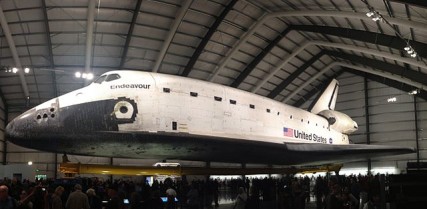Editor’s Note: This guest column was inspired by October’s Coffee Talk, which focused on money and ethics.

I remember reading a newspaper article, when the space shuttle Endeavour was retired in 2011. The last leg of the shuttle’s final trip was a ride on oversize flatbed trucks to the California Science Center in Los Angeles, but finding a route that could accommodate the trucks without disrupting traffic proved to be a problem. The final path wound circuitously through predominantly poor residential neighborhoods in L.A — places where frozen traffic would have the least impact on the economy of a busy city. I wondered then, and still wonder, what the sight of a space shuttle inching down the lane must have meant to the children of those neighborhoods. The space program is unquestionably expensive; the money America spent on Endeavour could have revolutionized those communities. But the benefits of the program, scientific, cultural and even economic, belong in some part to all of us. I wondered if the children of those neighborhoods still dream of being astronauts, or if those ambitions have become casualties of America’s unprecedented privatization of wealth and life chances — the dreams of a disowned public.
I make the comparison between the moon landing and our unequal economy for one reason: this didn’t happen by accident. The economy we have today represents the work of generations. Through our tax policies, lax pursuit of white-collar crime, and our insistence on measuring the health of the overall economy by the fortunes of the very richest, we have designed a set of policies guaranteed to move wealth in one direction, exporting poverty in the other. As consumers, we have become a nation of bargain-hunters reluctant to acknowledge that our choices have any meaning beyond our own wallets. And the concentration of top salaries in the finance sector has resulted in a ‘brain drain’ from every other industry, as our best and brightest, lacking any other standard of success, simply follow the money. But I worry most of all that we make similar mistakes in our own hearts: every economic system implies an ethical system, and the capitalist ethic, while it includes great respect for choice, property and for the accomplishments of individuals, equips us very poorly to live in community with each other. Our choices shape this economy, just as they shape our ethical lives.
Enrique Peñalosa, a former mayor of Bogotá, Colombia, famously said that a developed country, “is not one where the poor have cars; it’s one where the rich use public transportation.” I love that phrase, because it’s such a gentle way to say something revolutionary: to enter into a better world, you and I will give something up. If we react to that idea with distaste, with a feeling that it isn’t the way things are done, then that’s exactly the sensibility we need to turn upside-down. We have seen what happens when America lives by the ethics of greed. Let’s see what happens when we dedicate ourselves to a higher calling.
A mild-mannered data analyst by day, Charlie Byers is a sociology major at Eastern Washington University, a resident of Spokane’s bustling West Central district, and a regular at SpokaneFAVs events.










Hey Charlie!
Thanks for your thoughtful post.
I really liked your quote from Enrique Penalosa. When I lived in Massachusetts, people of all social strata rode public transportation regularly. Some of the reasons were economic (try renting a parking space in Boston. I bet it will be far more than your rent/mortgage here!) or convenience-based (driving in Boston is an extreme sport), and even a decision based on caring for the environment. Regardless of the reasons people chose public transportation, it was obvious that it was a great equalizer. There is no first class on a bus or a commuter train. Business people in suits may sit next to the person whose only worldly goods can be carried on his or her back. And we all suffer together when the train breaks down or is delayed. Maybe this is not going to solve any big world problems, but at least on public transportation, the very rich cannot silo themselves in a first class cabin and ignore the very great difference in the gap between rich and poor.
Thanks, Amy! I had a similar experience with public transit when I lived in Seattle, and I was especially struck by the contrast to the bus systems in L.A. and Las Vegas, which are more specific to marginalized populations. Spokane is a little harder to place. The Plaza is a decidedly working-class joint, but I think we get a surprisingly rich cross-section of the population on buses, given how easy it is to get around by car.
Nicole and I have talked before about the strange fact that Whitworth doesn’t have discounted bus passes for students. You have to wonder how it affects someone’s sense of the community, don’t you?
Charlie, thanks for this post and your mild-mannered data analysis. It is timely as well. I especially like that you name the non-accidental nature of our current economic place.